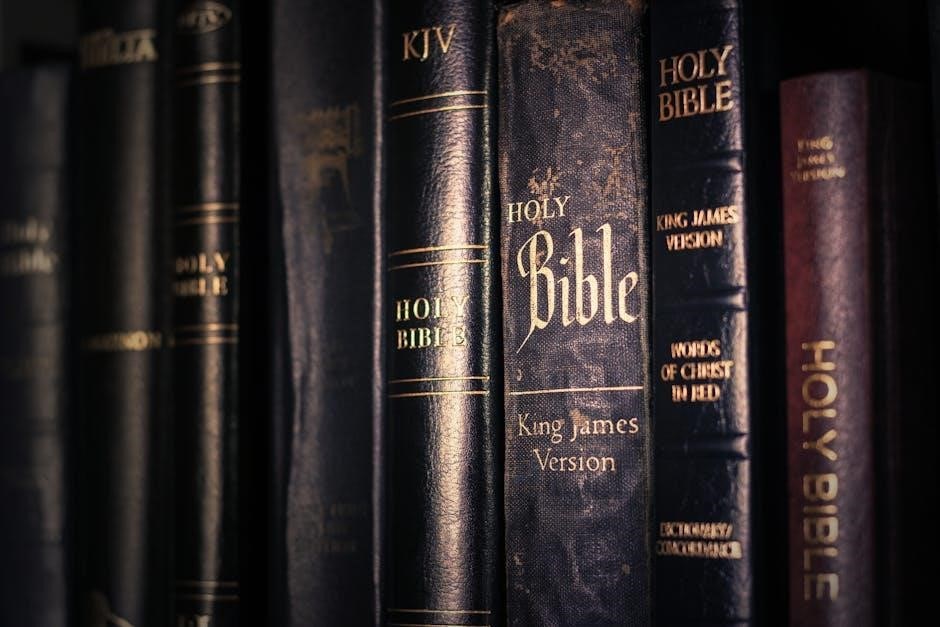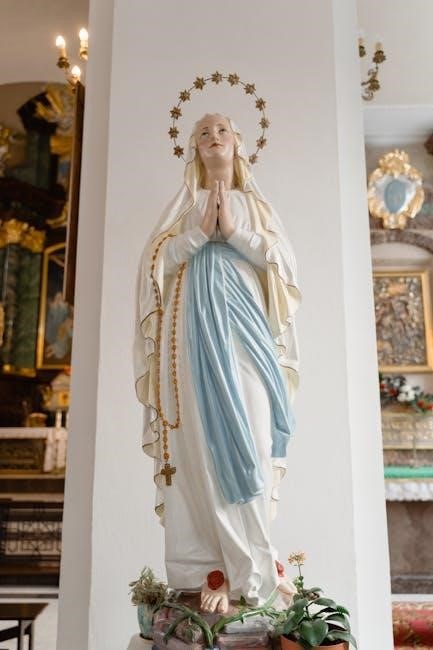The Bible provides a detailed timeline of prophets and kings, spanning from the United Kingdom under Saul, David, and Solomon to the Divided Kingdom of Israel and Judah. This period, from approximately 1050 BC to 586 BC, highlights the rise and fall of kingdoms, the role of prophets as messengers of God, and their influence on the political and religious landscape. Understanding this chronology is crucial for grasping the historical context of biblical events and their enduring significance in Jewish and Christian traditions.
1.1. Overview of the Biblical Timeline
The biblical timeline of prophets and kings spans approximately 1,000 years, from the transition of leadership under the judges to the fall of Jerusalem in 586 BC. This period is divided into the United Kingdom (under Saul, David, and Solomon) and the Divided Kingdom (Israel and Judah). Key prophets like Isaiah, Jeremiah, and Ezekiel played pivotal roles during these eras, addressing both spiritual and political issues. The timeline highlights the rise and fall of kingdoms, the influence of prophetic messages, and the enduring legacy of these figures in shaping biblical history.
1.2. Importance of Understanding the Chronology
Understanding the biblical timeline of prophets and kings provides clarity on the historical progression of God’s people, revealing the rise and fall of kingdoms and the role of prophets as messengers of divine will. This chronology helps contextualize key events, such as the construction of the Temple and the Babylonian Exile, while also highlighting recurring themes like obedience, rebellion, and redemption. Grasping this timeline enriches biblical study, offering insights into the interplay of faith and history.
The United Kingdom (Under Kings Saul, David, and Solomon)
The United Kingdom, spanning 1051–931 BC, marks the transition from judges to kings under Samuel’s influence. Saul, David, and Solomon ruled, shaping Israel’s monarchy and legacy.
2;1; King Saul (1051–1011 BC)
King Saul, Israel’s first king, ruled from 1051 to 1011 BC. Anointed by Samuel, he initially pleased the people but struggled with obedience and faith. His reign was marked by conflicts with the Philistines and internal strife. Despite early successes, Saul’s disobedience and jealousy, particularly toward David, led to his downfall. His tragic end, including the loss of his kingdom and life, serves as a cautionary tale of leadership and divine disfavor. This period set the stage for David’s rise to power.
2.2. King David (1011–971 BC)
King David, Israel’s second king, ruled from 1011 to 971 BC. He established Jerusalem as the capital and united the tribes under one monarchy. Known for his military prowess, David expanded Israel’s borders and brought the Ark of the Covenant to Jerusalem. Despite personal struggles, including the rebellion of his son Absalom, David remained a man after God’s heart. His reign marked the zenith of Israel’s power and laid the foundation for the Messiah, emphasizing his enduring legacy in biblical history.
2.3. King Solomon (971–931 BC)
King Solomon, the third king of Israel, ruled from 971 to 931 BC. Renowned for his wisdom, he built the First Temple in Jerusalem, solidifying Israel’s religious center. His reign saw economic prosperity and cultural advancements, but his later years were marred by idolatry due to his many foreign wives. Solomon’s wisdom, as recorded in Proverbs and Ecclesiastes, remains a cornerstone of biblical teachings. His reign marked the peak of Israel’s unity before the kingdom’s eventual division.
The Divided Kingdom (Israel and Judah)
After Solomon’s death, Israel split into two kingdoms: Israel (10 tribes) and Judah (2 tribes), each with their own kings and distinct timelines from c. 925–721 BC and 925–586 BC, respectively. Prophets played a crucial role during this period, addressing both kingdoms’ spiritual and political challenges, ultimately witnessing their falls to Assyria and Babylon.
3.1. Kings of Israel (c. 925–721 BC)
The kingdom of Israel, comprising 10 tribes, emerged after the division following Solomon’s death. Its first king, Jeroboam I, established idolatrous practices, setting a tone for future rulers. Over 200 years, Israel saw 19 kings, many of whom faced violent ends or usurpations. Notable figures include Ahab, known for his alliance with Jezebel and promotion of Baal worship, and Jehu, who eradicated Baal but failed to fully obey God. Israel’s history was marked by instability, sin, and eventual conquest by Assyria in 721 BC, leading to its people’s exile.
3.2. Kings of Judah (c. 925–586 BC)
Judah, comprising the tribes of Judah and Benjamin, lasted from 925 BC to 586 BC. Its history was marked by alternating periods of faithfulness and rebellion. Notable kings include Hezekiah, who truste
3.3. Key Prophets During the Divided Kingdom
During the Divided Kingdom, prophets played a crucial role in guiding both Israel and Judah. Elijah and Elisha ministered primarily to Israel, confronting idolatry and upholding God’s justice. Hosea and Amos addressed Israel’s spiritual decay, while Joel and Micah spoke to Judah, warning of judgment and promising restoration. Isaiah and Jeremiah, active during Judah’s later years, emphasized faithfulness to God and foresaw the eventual return from exile, blending judgment with hope for a redeemed future.

Major Prophets and Their Roles
Major prophets like Isaiah, Jeremiah, and Ezekiel played pivotal roles as God’s messengers, delivering prophecies of judgment, redemption, and hope, shaping Israel’s spiritual and political destiny.
4.1. Isaiah and His Prophecies
Isaiah, a prominent prophet of the 8th century BC, delivered prophecies of judgment and redemption to Judah. His visions included the coming Messiah and the restoration of Israel. Isaiah’s teachings emphasized moral integrity and faithfulness to God, addressing both the political turmoil of his time and the spiritual state of the nation. His prophecies remain central to both Jewish and Christian traditions, offering hope and a divine plan for humanity’s salvation and the world’s redemption.
4.2. Jeremiah and the Fall of Jerusalem
Jeremiah, a prophet active during the 7th and 6th centuries BC, witnessed the decline of Judah and the fall of Jerusalem in 586 BC. He called for repentance, warning of impending judgment due to the nation’s rebellion against God. Jeremiah’s prophecies included the destruction of the Temple and the Babylonian exile, fulfilling his message of divine judgment. Despite his personal struggles and imprisonment, Jeremiah’s words remain a powerful testament to God’s justice and mercy, shaping Jewish and Christian theology.
4.3. Ezekiel and the Exile
Ezekiel, a prophet and priest, ministered during the Babylonian exile (6th century BC). Exiled to Babylon, he received visions from God, including the destruction of Jerusalem and the Temple in 586 BC. His prophecies emphasized judgment for Israel’s sins and the hope of restoration. Ezekiel’s message highlighted individual accountability and the promise of a new covenant. His vivid imagery, such as the valley of dry bones, symbolized Israel’s resurrection and redemption, offering hope to the exiled community.

Minor Prophets and Their Contributions
The Minor Prophets, including Hosea, Joel, Amos, and Micah, delivered powerful messages of repentance, justice, and hope. Their prophecies addressed moral decay and promised restoration.
5.1. Hosea and His Message to Israel
Hosea, a prophet to the northern kingdom of Israel, emphasized God’s love and judgment. His marriage to Gomer symbolized Israel’s unfaithfulness. He called for repentance, urging Israel to return to the Lord, warning of impending judgment if they refused. Hosea’s prophecies highlighted the cycle of sin, judgment, and redemption, offering hope for restoration. His message remains a powerful call to faithfulness and compassion, reflecting God’s enduring love for His people despite their rebellion.
5.2. Joel and the Day of the Lord
Joel’s prophecies focus on the “Day of the Lord,” a time of judgment and divine intervention. He calls Israel to repentance, warning of locust plagues and darkness as symbols of God’s wrath. Joel emphasizes the need for genuine faith, urging the people to turn to the Lord with fasting, weeping, and heartfelt prayer. His message offers hope for restoration, promising God’s Spirit would be poured out on all people, a vision that resonates throughout biblical tradition and underscores the importance of spiritual renewal.
5.3. Amos and Social Justice
Amos, a prophet from the 8th century BC, emphasized social justice, denouncing the oppression of the poor by the wealthy. He condemned exploitation and corruption, urging Israel to live ethically. His famous phrase, “Let justice roll down like a river,” highlights God’s demand for fairness. Amos called for genuine worship over empty rituals, stressing that true faith must reflect in compassionate actions. His teachings remain central to biblical ethics, inspiring advocacy for the marginalized in Jewish and Christian traditions.
5.4. Micah and the Future Messiah
Micah, an 8th-century BC prophet, is renowned for his prophecy about the Messiah’s birth in Bethlehem. He emphasized justice, humility, and loyalty to God, condemning societal corruption. Micah’s vision of a future era of peace and restoration highlighted God’s faithfulness. His teachings underscored the importance of ethical living and the ultimate redemption through the Messiah, a message that resonates in both Jewish and Christian traditions, linking his prophecies to the broader biblical narrative of salvation and hope.

The Role of Kings in Biblical History
Biblical kings, from Saul to the fall of Jerusalem, shaped Israel’s history through leadership, both faithful and flawed, influencing the nation’s spiritual and political destiny.
6.1. The Transition from Judges to Kings
The transition from judges to kings marked a significant shift in Israel’s governance. The period of judges, characterized by charismatic leaders, ended with the people demanding a monarchy. Samuel, the last judge, anointed Saul as the first king, establishing a new era. This change reflected Israel’s desire for stability and unity, aligning with neighboring nations. The monarchy introduced a centralized authority, setting the stage for the rise of prominent kings like David and Solomon.
6.2. The Reign of Jeroboam I and the Split of the Kingdom
Jeroboam I, who reigned from 931 to 910 BC, played a pivotal role in the division of the kingdom. After Solomon’s death, Jeroboam, a former official, led the northern tribes in rebellion, establishing Israel as a separate kingdom. His reign was marked by idolatry, including the creation of golden calves, which led to divine judgment. The kingdom split into Israel (northern) and Judah (southern), setting the stage for centuries of division and conflict, as recorded in 1 Kings and 2 Chronicles.
6.3. The Significance of King Josiah’s Reforms
King Josiah’s reforms, initiated after discovering the Book of the Law during Temple repairs, aimed to restore pure worship and eliminate idolatry in Judah. He destroyed pagan shrines, reinstated the Passover, and centralized worship in Jerusalem. These efforts, though temporary, highlighted the importance of adhering to divine law and influenced post-exilic Jewish practices. Josiah’s reign marked a crucial attempt to revive spiritual fidelity, leaving a lasting legacy in Judah’s history and religious traditions.

The Role of Prophets in Biblical History
Prophets served as divine messengers, guiding the faithful, speaking against injustice, and offering hope through promises of restoration, profoundly shaping Israel’s spiritual and societal journey.
7.1. Prophets as Messengers of God
Prophets acted as intermediaries between God and humanity, delivering divine messages to guide the faithful and call people back to righteousness. Their role was to convey God’s will, often through visions, dreams, and direct revelations, ensuring His commands were heard and understood. This divine communication emphasized morality, justice, and faithfulness, making prophets pivotal in maintaining the spiritual integrity of Israel and Judah throughout biblical history.
7;2. Prophets as Critics of Kings and Society
Prophets often served as vocal critics of kings and societal norms, addressing injustices and moral failures. They condemned idolatry, corruption, and oppression, holding leaders accountable for their actions. Figures like Jeremiah and Hosea spoke out against the misuse of power and the neglect of God’s laws, calling for repentance and a return to righteous living. Their critiques were not merely political but deeply spiritual, aiming to align human actions with divine will.
7.3. Prophets and the Promise of Restoration
Prophets often conveyed God’s promise of restoration, offering hope amidst judgment. Ezekiel envisioned a future messiah and the renewal of Israel, while others like Jeremiah spoke of a new covenant. These prophecies emphasized divine mercy and the eventual redemption of God’s people, even after the Babylonian exile. The promise of restoration underscored God’s faithfulness and provided enduring hope, shaping the spiritual identity of both Jewish and Christian traditions.
Key Events in the Timeline
The timeline highlights pivotal events such as Solomon’s temple construction, the Assyrian conquest of Israel in 721 BC, and the Babylonian exile of Judah in 586 BC.
8.1. The Construction of the Temple by Solomon
Solomon, the third king of Israel, oversaw the construction of the First Temple in Jerusalem, a project that took seven years to complete. Built between 971–971 BC, the temple was a grand structure made of cedar wood, gold, and precious stones, symbolizing God’s presence among His people. Its construction marked the fulfillment of David’s desire to build a permanent place of worship, establishing Jerusalem as the religious and political center of Israel. This event showcased Solomon’s wisdom and wealth, solidifying his legacy as a ruler and a man of faith.
8.2. The Assyrian Conquest of Israel (721 BC)
The Assyrian Empire, under King Shalmaneser V, captured Samaria, the capital of Israel, in 721 BC, marking the end of the northern kingdom. This conquest resulted from Israel’s consistent disobedience to God and its political instability. The Assyrians exiled many Israelites, dispersing them across their empire, a event known as the “Lost Ten Tribes.” Prophets like Hosea and Amos had warned of this judgment, emphasizing the need for repentance. The fall of Israel served as a stark reminder of God’s judgment and the consequences of idolatry, while Judah, the southern kingdom, narrowly escaped a similar fate during this period.
8.3. The Babylonian Exile and the Fall of Jerusalem (586 BC)
In 586 BC, the Babylonian Empire, under King Nebuchadnezzar II, conquered Jerusalem, destroying the Temple built by Solomon and exiling many Judeans to Babylon. This event marked the end of the southern kingdom of Judah and the beginning of the Babylonian Exile, a period of captivity that lasted 70 years. Prophets like Jeremiah and Ezekiel had forewarned of this judgment due to Judah’s disobedience and idolatry. The exile became a pivotal moment in Jewish history, reshaping their identity and spiritual practices, and setting the stage for future restoration.
Historical Context and Archaeological Evidence
The ancient Near East’s political and religious dynamics shaped the Bible’s narrative. Archaeological discoveries confirm key events and rulers, validating the historical context of prophets and kings.
9.1. The Political and Religious Setting of the Ancient Near East
The ancient Near East was a complex tapestry of empires, kingdoms, and city-states, each with distinct political structures and religious practices. During the period of the biblical kings and prophets, major powers like Assyria, Babylon, and Egypt frequently interacted with Israel and Judah. These interactions significantly influenced the political and religious climates of the region. The presence of multiple deities and cultic practices contrasted sharply with the monotheistic worship of Yahweh in Israel, creating a unique religious dynamic that shaped prophetic messages and royal policies. This setting was pivotal in the development of the biblical narrative, as it provided the backdrop for both conflict and coexistence.
9.2; Archaeological Discoveries Confirming Biblical Accounts
Archaeological discoveries have provided significant evidence supporting the historical accuracy of the Bible. For instance, the Taylor Prism confirms the Assyrian conquest of Israel in 721 BC, while the Lachish Letters offer insights into the Babylonian siege of Jerusalem. Excavations at Megiddo and Samaria have uncovered remnants of royal structures, aligning with accounts of kings like Jeroboam I and Ahab. Additionally, artifacts such as the Uzziah seal and the Jehoash Inscription validate the existence of biblical figures and events, bridging archaeology and scripture.
The Legacy of Prophets and Kings
The prophets and kings of the Bible left an enduring legacy, shaping Jewish and Christian traditions through their teachings, leadership, and divine interactions, influencing faith and history.
10.1. The Influence of Prophets on Jewish and Christian Traditions
Prophets like Isaiah, Jeremiah, and Ezekiel profoundly shaped Jewish and Christian traditions through messianic prophecies and ethical teachings. Their visions of a restored Israel and a suffering Messiah laid the groundwork for Christian theology. The prophets’ emphasis on justice, compassion, and divine sovereignty continues to inspire faith communities, influencing worship, doctrine, and personal devotion across centuries, bridging ancient texts with modern spiritual practices and cultural identity.
10.2. The Enduring Impact of the Biblical Kings
The biblical kings, from Saul to Josiah, left a lasting legacy in shaping Israel’s history and religious identity. Their reigns established precedents for leadership, worship, and governance. Kings like David and Solomon laid the foundation for Jerusalem as a central religious site, while others, such as Jeroboam I, influenced the political and religious division of the kingdom. Their decisions and actions continue to influence Jewish and Christian traditions, highlighting the interplay between divine purpose and human leadership in shaping a nation’s destiny.